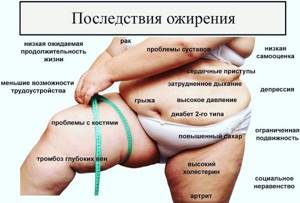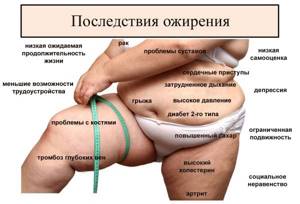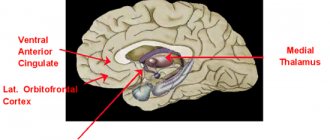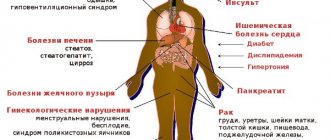The constant desire for psychological comfort forces many to abuse food, especially high-calorie foods. Such dependence serves as a source of positive emotions that are lacking in everyday life. The psychosomatics of obesity implies the presence of certain psychological motives due to which a person gains weight, while often not even suspecting the real reasons for being overweight. If metabolic disorders are caused by psychogenic factors, the patient will need qualified help from a psychologist.
Theories
The psychosomatics of excess weight in women is a long-spread, scientifically based phenomenon that needs to be studied by leading psychologists and esotericists of our time. Louise Hay notes that obesity is one of the manifestations of fear caused by an unwillingness to accept oneself and denial of the negative opinions of others.
Excess weight, according to the American doctor, is a means of psychological protection, as well as a sign of a person’s increased sensitivity.
So the fat layer is considered as a kind of shield. When fear is eliminated, the problem of obesity itself will disappear.
Liz Burbo believes that obesity is a move away from childhood fears, directed against those who severely abused a person in his childhood and adolescence. Also, excess weight, according to the psychologist, occurs under the influence of a mental block in people who strive to take a leading position in society, but do not consider themselves worthy of it.
Liz notes that overweight people are unable to adequately assess their actions and their psycho-emotional state, as a result of which they need to conduct a detailed analysis of the day every day, identifying unpleasant or shame-inducing moments.
According to Valery Sinelnikov, the fat layer is a defense that arises in people under the influence of fear or the inability to cope with their experiences and problems.
Palmist Dmitry Trotsky notes that the psychosomatics of excess weight is associated with the psychological suppression of feelings of resentment. According to Trotsky, a fat cell consists of 80% water, which stores information. If an offender appears and it is difficult and scary for him to express his dissatisfaction, the cell begins to increase in size to “accumulate resentment”, causing excess weight gain.
Psychosomatics of excess weight in women
Luule Vilma characterizes obesity as the desire to impose one's will on others, linking obesity with the desire to suppress and intimidate the enemy. According to Sergei Lazarev, excess weight, like other diseases, is caused by a lack of love.
Alexander Astrogor in his book divides obesity into:
- nutritional;
- endocrine;
- cerebral.
Alimentary obesity, according to the esotericist, is associated with the conditioned oral reflex of a person to receive joy through food. Like drug addicts and smokers, people suffering from psychosomatic obesity associate positive emotions only with tasty food.
According to the author, a passionate person has much more joy and less hunger, since the body receives emotions through contemplation and creation of beauty.
But endocrine obesity, according to Astrogor, is caused by strong pressure and oppression from a person’s loved ones, so, unfortunately, it cannot be treated on its own. This problem requires correction by individual and family psychotherapy.
According to the theory developed by experts about where excess fat accumulates, I can give a complete picture of the psychological problems that trouble a person:
| Pronounced double chin | Characterizes a patient who cannot and is afraid to express his thoughts |
| Excess weight on shoulders and arms |
|
| On the back, shoulders and neck | Occurs in people who are gnawed by a strong feeling of old guilt |
| Waist and belly |
|
| Legs and buttocks | Rejection of parental overprotection |
| Breeches | A large number of meaningless experiences |
Interpretation by Louise Hay
According to Louise Hay, the main causes of excess weight and obesity lie in the following:
- a variety of fears;
- strong need for protection;
- denial of your feelings and yourself;
- suppression of any desires that may hurt self-esteem (that is, almost everything);
- suppressed anger.
Every person needs protection, but overweight people do not have it. The invisible shell of confidence in one's own safety is formed in early childhood. This is a barely perceptible and yet quite strong feeling “I am always safe”: my parents will take care of me, I am always able to help myself, I have a roof over my head, arms, legs.
It seems so natural, and yet fat people don't feel it. Anxiety and tension always bleed in their subconscious, they force them to be in a state of endless stress - no one will ever help, no one will protect, no one will come to the rescue.
The feeling of security is instinctive, deep. If it is not there, it is difficult to build a happy life. But you should not look for protection from the outside, you need to look for it within. You must believe in your own strength, that you will always take care of yourself, always create an invisible protective dome for yourself and a pleasant development of the event. Cultivate this in yourself.
Symptoms
The psychosomatics of excess weight in women most often manifests itself in a constant desire to eat a variety of sweets. This quality can be observed especially often in people suffering from a lack of love and attention. This is how a child strives to get candy, because it seems to him that his parents love him little.
In adulthood, the constant presence of hunger is not associated with the physiological needs of the body, but with a lack of emotional nutrition and positive emotions.
Quite often, increased appetite occurs in women during stressful situations. Doctors note that in a normal psychological state, people easily lose weight, since the emotional side replaces the need for nutrition.
During periods of separation, strong psychological stress, and troubles, those suffering from psychosomatic disorders experience an emotional emptiness inside the body, which they try to fill on a physical level through nutrition, considering this the only possible way, as it seems to them.
There are 2 main signs of the development of psychosomatic excess weight:
- Night eating syndrome. It is characterized by a period of active food consumption at night and in the evening, followed by difficulty falling asleep and lack of morning appetite.

- Syndrome of bouts of gluttony in the event of conflict or any other difficult situations. In this case, the desire to have a snack visits the patient only in moments of psychological instability and is most often found in people prone to conflict situations and nervous disorders.
The initial stage of obesity is diagnosed when body weight exceeds normal values by not 15-20%. But psychosomatic patients include only those people who eat and gain excess weight impulsively, most often under the influence of critical and stressful situations.
Mental characteristics of women
To understand the psychology of obesity in the fair sex, it is first necessary to understand the characteristics of their psyche:
- Women can act in several directions simultaneously, which is determined by the structural organization of the brain. They are able to talk and listen at the same time, and in conversations they mention various topics and emotions that are associated with them.
- If a woman is immediately offered a solution to a problem, she will feel misunderstood.
- By scanning the emotions of people around them, women receive the necessary information, which makes it possible to understand relationships.
- Stressful situations for the weaker sex are not a reason to retire. A woman needs relaxation, which she gets through communication with others. When she shares what happened, she copes better with stress.
It is worth considering the environment in which the female psyche is formed. There are often situations where parents were expecting a son, but instead a girl was born. Accordingly, she could have been raised like a boy, which influenced her further behavior in adulthood.
Reasons for appearance
Psychosomatics of excess weight in women occurs more often than men by 30-40%, since the female gender, due to its physiological characteristics, is more emotional.
In the lives of girls, feelings and emotions predominate to a greater extent. Women who quickly get tired of monotony need constant attention, which is why they are always in search of new sensations, which makes them more prone to gaining excess weight for psychosomatic reasons.
Psychologists have established several reasons under the influence of which mental activity increases, provoking the release of large amounts of adrenaline and stress hormones into the body, affecting the stability of metabolic processes and provoking an increase in cellular reserves of fats and gluten:
- A kind of wealth from the opinions of the surrounding world. An insecure person uses the fat layer as a shell, allowing him to be invulnerable from the opinions of other people.
- Constant lack of attention. In young children, the need for sweets arises when there is a lack of love. An unstable psyche is capable of projecting children's needs to a later age, as a result of which the oral reflex is activated with the appearance of the inability to realize the thirst for attention from the opposite sex.
- Try to cope with anxiety and stress through delicious food. Sweets here act as a means of comfort.
- Low self-esteem or desire to please your partner. Some men symbolize curvy women with gentleness and good nature. This is especially true for people who preach the Muslim religion, where obesity is associated with the wealth and beauty of a woman.
- Mental or physical abuse experienced in childhood. While gaining weight, a woman subconsciously seeks to protect herself from the “dangerous” attention of the opposite sex, fearing a repetition of the traumatic situation.
- Receiving joy and pleasure in the absence of other ways to satisfy emotional needs.

- Constant desire to lose weight. Strict diets can easily disrupt normal metabolism, causing constant weight gain.
- Non-traditional sexual orientation. In this case, the woman is driven by the desire to show her masculine qualities in volume, while simultaneously protecting herself from the attention of the opposite sex behind a mask of unattractiveness.
- Preoccupation with caring for another family member. Quite often, women gain excess weight after childbirth, under the influence of fatigue and depression. Absorbed in caring for the child, the mother stops paying attention to herself, eating up her dissatisfaction with her appearance with sweets or confectionery.
Opinion of Valery Sinelnikov
According to V. Sinelnikov, excess weight is formed from the following reasons:
- need for protection;
- dissatisfaction with oneself;
- self-hatred;
- negative attitude towards oneself;
- self-criticism.
You need to understand that it’s not just that you judged yourself once for oversleeping. Self-criticism and non-acceptance of oneself are a way of life and thoughts. Every time you unconsciously compare yourself with a more successful classmate, a slender fashion model or a random passer-by, you lose and punish yourself with excess weight.
Self-flagellation for imperfection is indeed a common accompaniment of obesity. It is difficult to notice, these thoughts flash at lightning speed and are not considered harmful. What is it like to criticize yourself? After all, this will only make me better. No, you won't.
Overweight people are hypersensitive because they judge themselves every second. They have enough of their own critics in their heads, and when those around them also do this, it seems there is no end to it. Therefore, you can react too violently even to the wrong glance of a passer-by - you are easily touched to the quick, because you are already like a raw nerve.
Everything described above is applicable for people who suffer from excess weight due to heredity or from childhood. But there are also those who gain weight, for example, in the event of psychological trauma or a major event, including after childbirth.
Valery Sinelnikov pays special attention to the appearance of excess weight as a result of pregnancy and childbirth. Experts agree that after the birth of children, women experience hormonal changes, but from a psychological point of view, the woman’s entire consciousness is focused on caring for the baby and there is no time left for herself.
The appearance of a baby in the house is a strong test, despite the joy of the event itself. It is at such a moment that a woman should not forget about herself, but on the contrary, take care of her needs even more. Attention is paid to appearance, rest, and internal balance, because new fears come to the surface - the fear of being a bad mother, of harming, of doing something wrong.
If you have become overweight as a result of having a baby, dive deep into yourself: what thoughts provoked this? Why are you so hard on yourself? What are you guilty of and what are you condemning for?
It often happens that pregnancy and childbirth acted as a catalyst for the emergence of another problem - relationships with the husband. Couples may find that their intimacy fades into the background and changes in quality. A woman’s physiology also changes, and if the relationship was built only on superficial external data, then changes in the figure have an acute impact on self-esteem.
Diagnostics
Psychosomatics of excess weight (in women, men or children) is diagnosed during a psychological consultation.
A specialist, talking with a woman suffering from a disease, finds out:
- reasons that provoke the appearance of excess body weight;
- factors that interfere with weight loss.
During the session the following is studied:
- the general internal psychological state of a woman;
- climate in the patient's family and at her workplace;
- relationships with parents, spouse, children, other relatives;
- the patient has childhood psychological trauma caused by physical or mental abuse;
- features of existing relationships with the opposite sex (in particular, the reasons for separation from a partner are explored).
The specialist pays special attention to how the patient characterizes herself in relationships with the people around her. Does he suffer from any complexes or mental dependencies that could cause the development of pathology?
In addition to the conversation, the specialist conducts an MMPI test, which allows you to determine:
- patient's character traits;
- features of perception of reality;
- general human needs;
- emotional state of the patient;
- level of stress severity;
- the presence of defense mechanisms and psychological abnormalities.
The test is conducted orally or in writing. Within a certain time, the patient answers 567 questions from the doctor or fills out a manual (computer) form. Based on the results of the consultation, a diagnosis is made, and if psychosomatic dependence is detected, appropriate treatment is prescribed.
Treatment methods
Treatment methods for psychosomatics are based on individually selected psychological assistance to the patient. The doctor's goal during treatment is to determine the causes of weight gain and help create a “thin” image that helps eliminate obstacles blocking weight loss.

Objectives of psychotherapeutic treatment:
- make the patient feel and hear the needs of his body;
- work to eliminate factors that interfere with weight loss;
- normalize the patient’s eating behavior;
- to form a new way of life for a woman;
- record the result obtained.
Experts believe that under the influence of stress a person cannot adequately assess hunger and satiety, and, therefore, control the processes of eating.
In the process of treatment, selected specifically for each patient:
- the pleasure of eating is replaced with other things that bring joy, but do not contribute to excess weight gain (reading, dancing, hobbies, sports, cinema);
- a woman learns to identify and control her “true” and false hunger;
- getting rid of old grievances occurs;
- a person learns to accept himself with all his strengths and weaknesses;
- normalize relationships with loved ones and colleagues.
Louise Hay method
The founder of the psychological self-help movement is Louise Hay, who rightfully believes that fear is the strongest trigger for weight gain.
The American doctor of psychology proposes to base the treatment of psychosomatics on “harmonizing thoughts,” which help, through self-hypnosis, to convince a person to accept himself and the emerging situation as it is. According to her methodology, a sick person must be convinced of complete safety and the possibility of trust, first of all, in himself, and then in the people around him.

In substantiating her theory, Doctor of Psychology Hay notes that although she herself has never been fat, she tends to gain weight out of unreasonable fear of any situation.
Liz Burbo method
According to the psychologist's theory, obesity is caused by avoiding childhood fears and is directed against people who have offended people in the past. Also, increased nutrition provokes angry emotions, or a feeling of guilt for any long-standing offenses.
Since, according to the specialist, people with psychosomatics are not able to correctly assess their actions, treatment of the disease should be aimed at a consistent analysis of each day the patient lives, in order to search, identify and analyze the traumatic situation, and then eliminate its negative consequences.
Alexander Astrogor's method
To reduce nutritional weight, the astrologer advises switching your pleasure center to other activities. If you enjoy other things not related to food, the weight will gradually disappear.
The doctor advises treating endocrine fullness only with the help of individual and family psychotherapy, challenging doctors to determine the patient’s negative dependence on the person who offends him, accept and eliminate fear.
Methodology of Dmitry Trotsky
The innovative technique of palmist Dmitry Trotsky recommends that a sick person conduct research and establish at what time the process of weight gain began, or rather, the negative statements of which particular person hurt him very much, but did not allow him to adequately respond to insults, causing the patient to absorb and deny the resulting offense.
An esotericist specialist advises to bring out negative feelings and do not hesitate to speak out, asking for forgiveness from a loved one in advance. As soon as the resentment leaves the person’s body, the weight will continuously begin to decrease.

Psychotherapy is only the first, main step towards normalizing the condition, during which consultations, individual or group sessions, hypnosis are carried out and tranquilizers, antidepressants are prescribed that affect the patient’s sleep, emotional state and mood.
After psychotherapy, the 2nd stage of medical treatment is prescribed, which consists of prescribing:
- drugs that break down fat cells;
- low-calorie diet;
- herbal diuretic teas;
- sports loads.
To help normalize excess weight, experts have developed several rules to help a person understand that:
- you need to eat in moderation;
- You can get pleasure not only from sweets;
- weight loss is impossible without willpower;
- the process of losing weight is long and requires patience, since fat will not melt in one day;
- You should periodically distract yourself from thoughts about food.
- it is necessary to build a model of a beautiful, slender woman.
What is psychosomatics?
To make it clearer how gluttony appears, it is worth examining the term “psychosomatics”. Its essence is that any thought is material.
The psyche or soul is inextricably linked with the body, therefore any bodily impact affects thinking and emotions. Mental or psychological problems change the state of the body. If synaptic connections are formed, the activity of the nervous tissue will become automatic: an event is a consequence. It will become more difficult to eradicate negativity. For some people it's not even possible. Signs of the initial stage of overeating:
- There are problems at work, for example, the boss arranged a debriefing.
- To relieve a grudge, a person looks for a way. The simplest thing is to eat something “yummy” and switch the brain to digestion. Typical psychology of gluttony.
- The body gets used to solving the problem of lack of positive emotions with food. To get used to it, a little stress, a couple of buns, chocolates are enough.
- The next time, after a similar situation, a person will be drawn to a cafe or store unconsciously.
The worst thing in such a situation is the inability to track the beginning of the negative process. It is difficult to notice because at first only a small amount of nerve tissue is involved in the process. Once the connections within the brain are strengthened, it becomes a way of behavior. This is unconscious thinking - the central nervous system decides for a person.
The most famous person who proved the connection between the body, surrounding signals and events was Academician Pavlov, who conducted experiments on dogs. At the bell, the animals began to produce saliva if they were regularly accustomed to this order of things. When the distribution of food stopped after the bell, the reflex gradually faded away. This gives hope to people who do not believe in reprogramming themselves to different behavior on their own.
What consequences can occur with constant overeating:
- fat deposition on the inner walls of blood vessels - hence heart attacks, strokes;
- joint problems due to heavy loads;
- failure of the endocrine system, which cannot cope with calories;
- changes in appearance;
- constant spending on clothes;
- depression due to the inability to find a way out of the situation.
The good news is that there is a way out, but it is found by people who are ready to change their habits and work on themselves in terms of the psychology of overeating. This must be said openly, without hiding behind beautiful phrases.
Possible complications
In women, if psychosomatic treatment is incorrectly carried out or abandoned, a relapse of the pathology occurs. Refusal of psychological help in favor of an exclusively fat-burning set of measures and medications initially leads to weight loss, but after 2-3 years the patient will seek help again, since the extra pounds will return in full.

In addition to obesity, repeated weight gain may result in the appearance of concomitant diseases, including:
- endocrine pathologies;
- cardiovascular problems;
- violation of bone tissue structure;
- diabetes;
- hormonal disorders;
- hyperhidrosis;
- shortness of breath and breathing problems.
Why you need to fight the problem
Obesity is a chronic progressive metabolic disease, manifested by excessive deposition of adipose tissue in the body with subsequent increase in body weight. The disease is chronic in nature, difficult to treat, and weight returns. This happens for reasons of positive energy balance, when the body receives more energy than it can expend. The problem of obesity is multifaceted; there are more causes than treatments. Overweight people have many diseases, especially cardiovascular diseases, live shorter lives, are limited in many ways, and their quality of life and social communication also suffers.
Complications of excess weight:

- Diseases of the heart and blood vessels (hypertension, angina, myocardial infarction, arrhythmia).
- Respiratory congestion.
- Diabetes mellitus type 2.
- Vascular atherosclerosis is common (intermittent claudication).
- Cerebrovascular accident.
- Joint diseases (deforming osteoarthritis, osteochondrosis).
- Fatty infiltration of the liver.
Forecast
Unfortunately, the prognosis for treatment cannot be called favorable. Only 5-20% of patients are able to completely trust a specialist, open up, overcome their fears, change their diet and daily routine
The rest of the patients have too many “skeletons” in their closet and are unwilling to help a specialist get to the root of the problem. These women come to see a psychologist wanting to lose weight, but do not want to find out the essence of the problem, or change their current diet and daily routine, even knowing about the possible problems of internal organs that arise with obesity.
According to research, in 30-35% of cases, the problem of obesity is associated not only with genetic predisposition and a sedentary lifestyle, but also with psychological problems based on childhood fears, complexes, lack of love and attention.
Timely psychological help will allow women who are accustomed to “eating a problem” to learn to cope with old grievances and fears and enjoy things that are not related to food.
Article design: Vladimir the Great
Help from psychologists
To eliminate incorrect thinking, there are specialists - psychotherapists, and they are armed with meditation, coaching, and various techniques for changing consciousness. There were cases when even a diet was not useful - just understanding the essence of the problem was enough to stop acting according to an unfavorable scenario.
If you know that the individual’s psyche is programmed to receive joy and pleasure, excess food intake must be replaced with something else that brings satisfaction. It is not recommended to get carried away with diets, since the body reacts to them with fear of restrictions. If you can choose a type of nutrition that will not be perceived as a restriction, then you can safely add an additional way to get rid of kilograms.
You can pay money and get a consultation with a psychologist. You can do this yourself. There is a lot of different literature, free videos that successfully solve the problem of excess weight, here is one of them:











